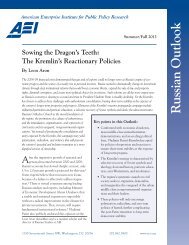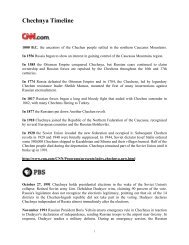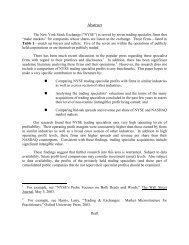Download the PDF - American Enterprise Institute
Download the PDF - American Enterprise Institute
Download the PDF - American Enterprise Institute
Create successful ePaper yourself
Turn your PDF publications into a flip-book with our unique Google optimized e-Paper software.
Slavery and <strong>the</strong><br />
Constitutional Convention<br />
2013 Walter Berns Constitution Day Lecture<br />
“The Founders were not all-seeing or all-wise. Both history<br />
and <strong>the</strong>ir constitutional order developed in ways <strong>the</strong>y<br />
did not foresee and for which <strong>the</strong>y had not provided well.<br />
Yet we ought not to be so harshly dismissive of <strong>the</strong>m.<br />
Because <strong>the</strong> vision of racial equality . . . is, after all, a vision<br />
built on <strong>the</strong>ir commitment to, and <strong>the</strong>ir construction of, a<br />
natural rights republic—a republic where all men are held<br />
to be created equal and endowed by <strong>the</strong>ir creator with certain<br />
unalienable rights.”<br />
—Michael P. Zuckert<br />
This year marks <strong>the</strong> 150th anniversary of <strong>the</strong> issuance of <strong>the</strong> Emancipation<br />
Proclamation and <strong>the</strong> 50th anniversary of <strong>the</strong> March on Washington, seminal<br />
events in America’s effort to deal with and overcome <strong>the</strong> legacy of<br />
slavery. Key to understanding that legacy is <strong>the</strong> place of slavery at <strong>the</strong> 1787<br />
Constitutional Convention and <strong>the</strong>nce in <strong>the</strong> US Constitution.<br />
In a lecture marking <strong>the</strong> 226th anniversary of <strong>the</strong> signing of <strong>the</strong> US<br />
Constitution on September 17, 1787, Michael P. Zuckert (University of<br />
Notre Dame) critically examined <strong>the</strong> leading pro and antislavery interpretations<br />
of <strong>the</strong> Constitutional Convention and offered an alternative analysis<br />
tied to a more accurate and less anachronistic reading of <strong>the</strong> principles and<br />
politics of <strong>the</strong> Founding era. Zuckert’s lecture was <strong>the</strong> second in a series<br />
named for distinguished AEI scholar Walter Berns.






